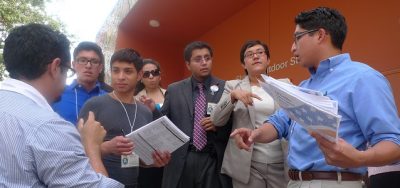Integration

Why Are Some Still UnDACAmented?
The latest USCIS DACA numbers from March show that the agency has received roughly 470,000 applications, which means that just under half of those estimated to be eligible have applied. While the success reflected by the 470,000 figure is not to be downplayed, the new numbers beg the question: What about the other half million? Why are they still unDACAmented? Read More

Guaranteeing Access to Health Care to Immigrant Women: A Necessary and Wise Investment
In the current public debate regarding comprehensive immigration reform, the focus on immigrant access to health benefits has been almost exclusively limited to cost (which is undeniably an important aspect) and has rarely addressed the social gains that result from investing in a healthy population. For the most part, the health of immigrant women has been left out of the discussion, which is, in many aspects, problematic. Read More

The Pathway to Citizenship and Immigrant Integration: What Can We Learn from France and the United States?
As the 113th Congress engages in a historic debate on immigration reform, past attempts to overhaul immigration laws provide cautious reminders of the struggles and opportunities ahead in closing a deal on immigration policy. While the United States' own history is critical for understanding both the shortcomings and solutions of various policy arrangements, the experience of other receiving countries in dealing with immigration and immigrant integration also constitute an invaluable source of guiding lessons. By learning what effective policy solutions have been formulated in other countries to address issues such as the regularization of their undocumented population, the integration of newcomers, and the reception of asylees, to mention just a few – the United States can better and more strategically craft immigration policy and anticipate the impact of those policy changes. Read More

Nativist Group Releases Confusing Report on Legalization
The work of the nativist Center for Immigration Studies (CIS) is focused on grinding an anti-immigrant ideological axe, not on gathering evidence and employing rigorous analysis. A case in point is CIS’s recent report on the hypothetical cost of processing an “amnesty application.” It is difficult to discern what the point of the report actually is. It would seem to be that unauthorized immigrants are bad for the U.S. economy (which is false), and that legalizing them would offer no benefits for the U.S. economy (which is also false), so there shouldn’t be a new legalization program, but if there is going to be a new legalization program, it should be so expensive that lots of unauthorized immigrants can’t afford it, which would presumably leave a large unauthorized population in the United States, which would presumably still be bad for the U.S. economy. Needless to say, this is a rather convoluted analysis. Read More

Immigration Watchdogs: Keep Calm and Press On
We’ve hit a point in the life cycle of the long awaited Senate immigration reform bill that a lot of parents will remember well. It’s those last few days before the baby is born, when anxiety and excitement are present in equal measure. Rather than speculating about the baby’s eye color or who the baby will resemble, however, speculation on the Senate immigration bill revolves around the bill’s substance. Will it carry through on the promise of a reasonable path to citizenship for the undocumented? How will it balance the interests of business and labor in a temporary worker program? Will there be additional STEM visas? Are there really going to be cuts to the family system in favor of some new mechanism for admitting employment and family based immigrants? There have been a host of media reports this past week fueling speculation on these questions and others, but the bottom line is that we simply won’t know until we see the text of the bill. Read More

Supporting STEM Education Where It’s Most Needed
Geography is a topic often lost in national-level immigration policy and the ensuing conversations around comprehensive reform. We frequently hear statistics cited at the national level. However, all too often, data at the metropolitan and local level – where the challenges and opportunities of immigration policy play out – are overlooked in policy debates. Read More

The Sooner Immigrants Become Citizens, the Better it is for the Economy
As lawmakers negotiate the contours of an immigration reform bill, they should keep in mind that the granting of legal status to undocumented immigrants would be a boon for the U.S. economy—and allowing undocumented immigrants to eventually become U.S. citizens would be an even bigger boon. Such is the finding of a report from the Center for American Progress (CAP), entitled The Economic Effects of Granting Legal Status and Citizenship to Undocumented Immigrants. The report was authored by Robert Lynch, a Visiting Senior Fellow at CAP and the Everett E. Nuttle professor and chair of the Department of Economics at Washington College, and Patrick Oakford, a Research Assistant at CAP. The authors explain succinctly why legalized immigrants and newly minted U.S. citizens are so economically valuable: Read More

Why Regional Economies Need Immigration Reform
Comprehensive immigration reform and its array of issues is a hot topic of discussion these days at the national level. Yet while those in Washington continue crafting proposals, states are most impacted by the country’s current outdated immigration system and are making the economic and moral case for reform, as a recent Chicago Council on Global Affairs report highlights. Read More

Republican Party Officially Backs Immigration Reform
Today, the Republican National Committee formally endorsed comprehensive immigration reform, bringing its position back in line with the Republican Party platform of 2004. Championing immigration reform was among the suggestions offered in a report released today about how the RNC can reinvent itself as part of a $10 million plan to reach out to minority groups. "We must embrace and champion comprehensive immigration reform," says one recommendation in the 100-page report, according to the Associated Press. "If we do not, our party's appeal will continue to shrink." Read More

The Promise and Challenges of Family-Based Immigration
Today the U.S. House Committee on the Judiciary is hosting a hearing on “The Separation of Nuclear Families under U.S. Immigration Law”. The issue to be addressed relates specifically to the obstacles that many legal permanent residents (LPR) currently living in the United States face when they try to bring their immediate relatives to the country. While there are neither country nor yearly caps for immediate relatives (currently defined as opposite-sex spouses and minor children) of U.S. citizens who want to immigrate to the United States, there are only 87,900 immigrant visas available each year for immediate relatives of LPRs. In addition, no country can receive more than 7 percent of the visas available for all immigration categories in a fiscal year. In 2012, for example, the maximum number of visas available per country was 47,250. And because the demand for visas in some countries is much larger than the number of visas available, some LPRs have to wait several years to be able to bring their spouses and unmarried children. Read More
Make a contribution
Make a direct impact on the lives of immigrants.
